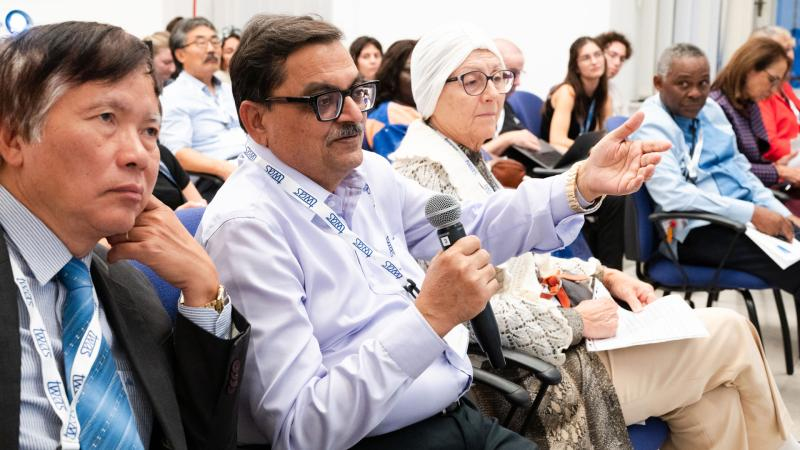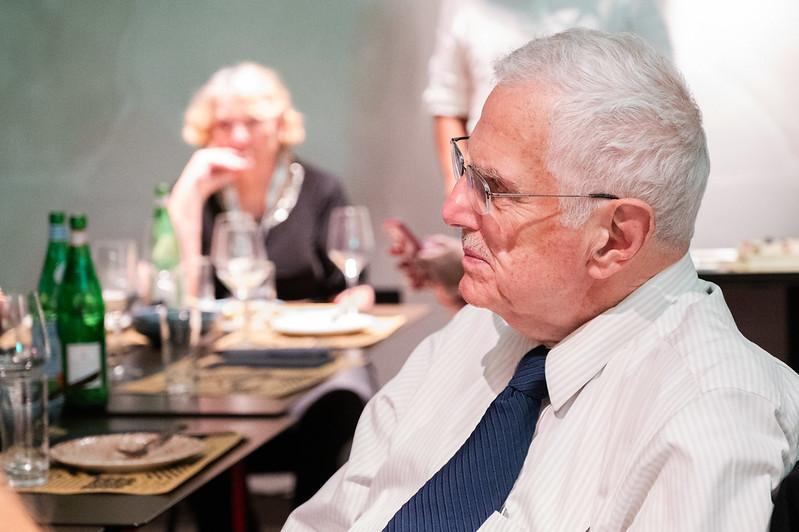Image
![TWAS Fellow Itziar Aretxaga at Large Millimeter Telescope Alfonso Serrano in Mexico. [Photo provided]](https://twas.org/sites/default/files/styles/cke_media_resize_large/public/media/1-aretxaga.jpg?itok=Wf-TzOHF)
"Knowledge is not power; the curiosity to seek knowledge is power. Imagination is more important than knowledge, for imagination embraces everything in the world!" — Albert Einstein
|
TWAS Fellows: the heart of the Academy![TWAS Fellow Itziar Aretxaga at Large Millimeter Telescope Alfonso Serrano in Mexico. [Photo provided]](https://twas.org/sites/default/files/styles/cke_media_resize_large/public/media/1-aretxaga.jpg?itok=Wf-TzOHF) What are TWAS Fellows?As a global, merit-based science academy, TWAS represents the elite of scientific accomplishment in, or related to, the developing world. Only scientists who have achieved the highest level of international standards—and have made significant contributions to the advancements of science—can be elected TWAS Fellows. TWAS Fellows are not the same as recipients of TWAS fellowships, which are programmes designed to give new and early-career scientists needed PhD education and postdoctoral training. TWAS Fellows are also sometimes alternatively referred to as “members” of TWAS. Membership is for life. TWAS was founded in 1983 by a distinguished group of scientists from the global South and North, under the leadership of Abdus Salam, the Pakistani physicist and Nobel laureate. They are known as the 42 Founding Fellows, and the number of members has grown ever since. ![An historical photo of TWAS Founder and Founding Fellow Abdus Salam of Pakistan in 1985. Salam, who was also a Nobel laureate in physics, is welcoming United Nations Secretary General Javier Pérez de Cuéllar to TWAS's first-ever General Conference in Trieste, Italy. [Photo: TWAS]](https://twas.org/sites/default/files/styles/cke_media_resize_large/public/media/2-abdus-salam-at-ictp.png?itok=rVkQOJs-) How many TWAS Fellows are there now?On average, about 50 new Fellows are elected each year, and overall membership is currently well over 1,000. For detailed information on the number of Fellows, the countries they represent, their fields of science, and more, please see the TWAS Directory. ![Current TWAS President Quarraisha Abdool Karim, in front, with colleagues at the Centre for the AIDS Programme of Research in South Africa (CAPRISA), which she co-founded. Before she became president of the Academy, she was a TWAS-Lenovo Science Prize winner and a TWAS Fellow. [Photo provided]](https://twas.org/sites/default/files/styles/cke_media_resize_large/public/media/7-web_karim_at_desk.jpg?itok=sEHM_JTn) What do TWAS Fellows do?TWAS Fellows have the right to attend any and all General Conferences of TWAS, which are held every other year and are a unique showcase for the best of developing world science. They can also participate in TWAS programmes as visiting experts, teaching seminars and providing training to countries where scientific capacity is lagging. Fellows also provide expertise on their subject to fellow scientists, scholars, journalists, and policymakers. On a case-by-case basis, they often continue to produce remarkable scientific research, work to advance access to science education in their home countries, and provide scientific advice and resources to policymakers. They can be invited to serve on TWAS’s statutory committees or other committees providing scientific advice.  How does one become a TWAS Fellow?Towards the end of every year, the Academy elects a new class of Fellows, who are inducted on 1 January of the next year. An induction ceremony takes place during the TWAS General Conference. The process of becoming a Fellow is highly selective and rigorous. The scientist must first be nominated, and only an established TWAS Fellow may make this nomination, which must be followed by a second TWAS Fellow’s endorsement. Nominations must be submitted by 31 March of each year. The online nomination form is available to Fellows only, and can be found here (log in to twas.org first). Nominees are assessed by referees and then evaluated by one of the Academy’s Membership Advisory Committees (MACs)—there is one for each membership section, which represent different areas of scientific research. The sections are:
The TWAS Elections Committee, comprised of every MAC chair and the TWAS president, then convenes and submits a final list of recommended candidates for election. That list is then submitted to the TWAS Council. If approved, it is later submitted to the full body of TWAS members for final approval, either during the TWAS General Meeting or by an online form. If the full list of candidates receives a favourable majority vote, the new class is elected. ![Victor Alberto Ramos at Portezuelo Navarro Mendoza in the Andes in 1987. [Photo provided]](https://twas.org/sites/default/files/styles/cke_media_resize_large/public/media/4-victor-ramos.jpg?itok=jTBD7MaF) What are the criteria to become a TWAS Fellow?The main criterion is scientific excellence. Only scientists who have attained the highest international standards and have made significant contributions to the advancement of their scientific field can be nominated. Candidates may work and live anywhere in the world, but if working and living in a developed country, they must also have distinguished themselves in efforts to promote science in developing countries. They must also be younger than 70 at the time of nomination, and be a member of a well-established and recognized national science academy, if such a body exists in the candidate's country. ![Evelyne Mbede, a TWAS Fellow and Tanzanian vulcanologist, working in the field. [Photo provided]](https://twas.org/sites/default/files/styles/cke_media_resize_large/public/media/8-mbede-field-overalls.jpg?itok=I20AeGme) What are some examples of TWAS Fellows?Here are just a few examples:
 Where can I find out more about individual TWAS Fellows?The TWAS Directory provides a full and searchable list of TWAS Fellows, including photos and basic information about their achievements, and references to where you can learn more about their work. |
分享至
1996 - 2025 亚洲科学技术研究院 版权所有 京ICP备08327942号-9 京公网安备1106384472193号 网站标识码sm76000395
地址:新加坡Blk 6Singapore General Hospital Level 6
电话: +65 86568589(新加坡) +86 15932656572
编辑部邮箱:GuoJiaSheHuiKexue@qq.com sia-committe@hotmail.com